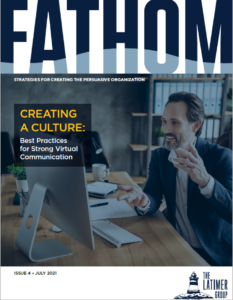
Hello, clients and friends of The Latimer Group,
We are excited to share Fathom with you. We launched Fathom in late 2019, took a break from it in 2020 while we dealt with more pressing business issues, and then reintroduced you to this publication in March 2021. The tagline for Fathom is “Strategies for Creating the Persuasive Organization,” which exactly captures our intent with this piece. While our goal with our daily blog is to help the individual think through and improve their communication and leadership skills, our goal with Fathom is to approach communication issues from the organizational level. Fathom will be published several times per year, with a rotating list of authors.
In this issue, my outstanding colleagues Hannah Morris and Kendra Raguckas continue their analysis of the new virtual communication world we are living in. Here they provide some clear and powerful best practices for organizations and their leaders to consider. Great organizational communication skills can, and should, be built from both a top-down and a bottom-up approach. Organizational leaders need to be thinking about the communication culture and organizational norms that should be in place… and then work hard to make those norms every day behaviors. Hannah and Kendra will help you think this through.
Our team is proud of Fathom, I am proud of my colleagues, and we hope you enjoy this issue. – D.M.B.
Virtual communication, already a significant part of our workplaces, grew to be our only avenue for interaction during the COVID-19 pandemic. The disruption caused by stay-at-home orders forced sometimes painful transitions, but it also created the opportunity for significant evolution and innovation across business. In our last issue, we looked at the overall picture of the advantages of virtual communication, its impact on creative processes, and its potential pitfalls. In this issue, we look at ways to implement more specific best practices to get the most out of virtual communication.
Communication is required to create a strong workplace culture—one that has the flexibility to allow in-person, remote, and hybrid employees to contribute their best work. This kind of culture relies on leadership that clearly and consistently articulates the values and mission of the organization and identifies the practices and policies that support those values.
To subscribe and continue reading this and past issues, visit the Fathom page on our website.
Does your team:
– Take too long to make decision?
– Fail to ask for what it wants or needs from you?
– Make things too complicated?
– Deliver unconvincing or disorganized presentations?
– Have new hires who are unprepared to communicate in the workplace?
We transform teams and individuals with repeatable toolsets for persuasive communication.
Explore training, coaching, and consulting services from The Latimer Group.
Looking for more from The Latimer Group?
- 3 Visual Mistakes to Avoid in Your Next Slide Deck
- Persuasion is Not Always Possible
- What Are Your Coffee Beans?
- The Recipe for Great Business Communication
- Bridging the Gap Between Intent and Impact
Looking for more from The Latimer Group?






Comments